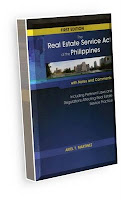

DOF DEVOLVES PROCESSING AND APPROVAL OF ZONAL VALUES
The Department of Finance by virtue of Department Order (DO) 6-2010 dated March 12, 2010 revised the composition of the various Committees involved in the zonal valuation process in the BIR.
Previously, a centralized Committee consisting of senior people in the DOF and the BIR was involved in the zonal valuation process. This structure resulted in a tedious and long processing and approval of real properties zonal valuations, which have not been revised for over 5 years.
With DO 6-2010, the processing and approval has been devolved to the Regional Director (RD) and the Revenue District Officers (RDO). The BIR Committees consist of the Executive Committee on Real Property (ECRPV) chaired by the Regional Director; Technical Committee on Real Property Valuation (TCRPV) chaired by the Assistant Regional Director and the Sub-TechnicalCommittee on Real Property (STCPRV) chaired by the Revenue District Officer (RDO) and co-chaired by the Assistant RDO.
The members of the Executive Committee are officials from various external agencies like the Housing and Land Use Regulatory Board (HILURB), Bureau of Local Government Finance (BLGF) and 2 licensed and competent appraisers from a reputable association/organization of realty appraisers. Consultants are officials from the Land Registration Authority (LRA), National Tax Research Center (NTRC),
National Mapping and Resource Information Authority (NMRIA) and the National Housing Authority (NHA). For the Technical Committee their members are from HLURB, Provincial /City Assessor and 2 licensed and competent appraisers from reputable association/organization or realty appraisers and consultants are representatives from LRA, NTRC, NMRIA and NHA.
The Sub-Technical Committee members are from the Municipal/Assistant City Assessor, Local Development Officer from the Office of the Mayor and 2 licensed and competent appraisers from a reputable association/organization of realty appraisers.
The Executive Committee will study and approve the proposed Schedule of Zonal Values prepared by the Sub-Technical Committee as reviewed by the Technical Committee. They will also deliberate and resolve cases referred by the Technical Committee.
The Technical Committee has a more extensive task of studying and reviewing the proposed Schedule of Zonal Values prepared by the Sub-Technical Committee and recommendation of the same to the Executive Committee; attending of public hearings relative to the establishment/revision of the Schedule of Zonal Values; deliberation and resolution of appealed cases or controversies as to valuation issues in the Regional and RDOs; assignment of zonal values of properties not listed/included in the approved Schedule of Zonal Values and the endorsement to the Executive Committee unresolved appealed cases for resolution.
The Sub-Technical Committee is tasked to study and prepare the schedule of recommended zonal values of real properties under the jurisdiction of the Revenue District Office (RDO) and conduct public hearing on the proposed zonal values.
In addition, for those with no available private appraisers in the locality; and/or if there is failure of any member of the Sub-Technical Committee to attend meetings; and/or there is failure of any of the member/s to submit their recommended values within 10 days from the date of the concluding meeting, the chairman of the said Committee shall execute an Affidavit and proceed with the establishment/revision of the Schedule of Zonal Values.
The establishment or revision of the Schedule of Zonal Values should be based on the average of the 2 highest recommended values or best data/documents available.
All provincial, city and municipal assessors are required to render assistance to the above Committees in the determination of real properties in their in their respective areas of jurisdiction. Likewise, the Committees are authorized to avail of the services of the DOF and the Bureaus and offices under it.
Commissioner Joel L. Tan-Torres said that DO 6-2010 "will now expedite the updating of all zonal valuations of real properties in the country would correspond to increase in taxes collected from transactions of these properties. All Revenue District Offices throughout the Philippines have been mandated to complete their updating of their zonal valuation not later than June 30, 2010".
The zonal value of a real property is the basis for the computation of capital gains tax and transfer taxes for sellers of real properties not used in business.
Please refer to : REYMARIE T. DE LA CRUZ, Chief, TIED
Approved for Release : AIDA S. SIMBORIO, OIC-ACIR, TAS
______________________________________________________________




